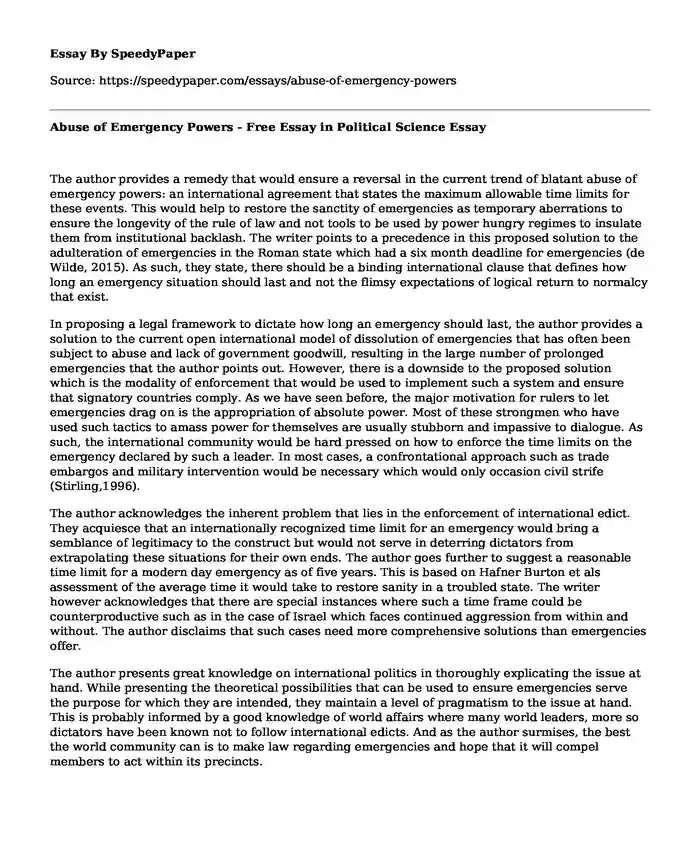
| Type of paper: | Essay |
| Categories: | Politics Political science |
| Pages: | 3 |
| Wordcount: | 667 words |
The author provides a remedy that would ensure a reversal in the current trend of blatant abuse of emergency powers: an international agreement that states the maximum allowable time limits for these events. This would help to restore the sanctity of emergencies as temporary aberrations to ensure the longevity of the rule of law and not tools to be used by power hungry regimes to insulate them from institutional backlash. The writer points to a precedence in this proposed solution to the adulteration of emergencies in the Roman state which had a six month deadline for emergencies (de Wilde, 2015). As such, they state, there should be a binding international clause that defines how long an emergency situation should last and not the flimsy expectations of logical return to normalcy that exist.
In proposing a legal framework to dictate how long an emergency should last, the author provides a solution to the current open international model of dissolution of emergencies that has often been subject to abuse and lack of government goodwill, resulting in the large number of prolonged emergencies that the author points out. However, there is a downside to the proposed solution which is the modality of enforcement that would be used to implement such a system and ensure that signatory countries comply. As we have seen before, the major motivation for rulers to let emergencies drag on is the appropriation of absolute power. Most of these strongmen who have used such tactics to amass power for themselves are usually stubborn and impassive to dialogue. As such, the international community would be hard pressed on how to enforce the time limits on the emergency declared by such a leader. In most cases, a confrontational approach such as trade embargos and military intervention would be necessary which would only occasion civil strife (Stirling,1996).
The author acknowledges the inherent problem that lies in the enforcement of international edict. They acquiesce that an internationally recognized time limit for an emergency would bring a semblance of legitimacy to the construct but would not serve in deterring dictators from extrapolating these situations for their own ends. The author goes further to suggest a reasonable time limit for a modern day emergency as of five years. This is based on Hafner Burton et als assessment of the average time it would take to restore sanity in a troubled state. The writer however acknowledges that there are special instances where such a time frame could be counterproductive such as in the case of Israel which faces continued aggression from within and without. The author disclaims that such cases need more comprehensive solutions than emergencies offer.
The author presents great knowledge on international politics in thoroughly explicating the issue at hand. While presenting the theoretical possibilities that can be used to ensure emergencies serve the purpose for which they are intended, they maintain a level of pragmatism to the issue at hand. This is probably informed by a good knowledge of world affairs where many world leaders, more so dictators have been known not to follow international edicts. And as the author surmises, the best the world community can is to make law regarding emergencies and hope that it will compel members to act within its precincts.
References
de Wilde, M. (2015). Just trust us: a short history of emergency powers and constitutional change. Comparative Legal History, 3(1), 110-130.
Hafner-Burton, E. M., Helfer, L. R., & Fariss, C. J. (2011). Emergency and escape: Explaining derogations from human rights treaties. International Organization, 65(4), 673-707.
Johnson, D. H. (2003). The root causes of Sudan's civil wars (Vol. 5). Bloomington: Indiana University Press.
Levinson, S., & Balkin, J. M. (2010). Constitutional Dictatorship: Its Dangers and Its Design. Minnesota Law Review, 94, 1789.Neumayer, E. (2013). Do governments mean business when they derogate? Human rights violations during notified states of emergency. The Review of InternationalOrganizations, 8(1), 1-31.
Stirling, P. (1996). Use of Trade Sanctions As an Enforcement Mechanism for Basic Human Rights: A Proposal for Addition to the World Trade Organization, The. Am. UJ Int'l L. & Pol'y, 11, 1.
Cite this page
Abuse of Emergency Powers - Free Essay in Political Science. (2019, Dec 02). Retrieved from https://speedypaper.net/essays/abuse-of-emergency-powers
Request Removal
If you are the original author of this essay and no longer wish to have it published on the SpeedyPaper website, please click below to request its removal:
- Free Essay: A Case Study of Samsung Employees' Relations
- Pemsel and Wiewiora
- Free Essay That Includes Visual Basic Project Documentation
- Essay Example: Ethics in the Supply Chain Management
- Essay Sample on South Africa Transport Infrastructure Market Opportunity
- Essay Sample on Professional Soccer in the United States
- A Report on 'Operating with Impunity'
Popular categories




